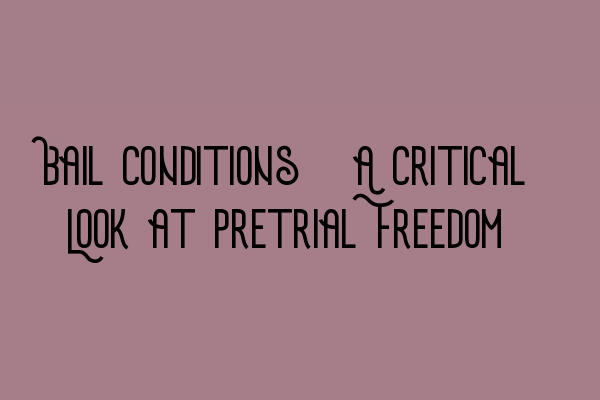Bail Conditions: A Critical Look at Pretrial Freedom
When a person is arrested and charged with a crime, the issue of bail conditions becomes crucial in determining their pretrial freedom. Bail is an essential concept in criminal law, as it allows an accused individual to be released from custody while awaiting trial. However, the conditions set for bail can significantly impact a person’s liberty and legal rights.
The Importance of Bail
Bail serves several important purposes within the criminal justice system. It aims to ensure the appearance of the accused at trial, prevent the commission of further crimes, and protect the interests of victims and witnesses. By granting bail, the court recognizes the presumption of innocence and acknowledges an individual’s right to freedom, while also addressing concerns of public safety.
However, the imposition of bail conditions can restrict an individual’s liberties beyond what is necessary and reasonable. It is essential to strike a balance between safeguarding the public and respecting an accused person’s rights.
The Role of Bail Conditions
When determining bail conditions, the court considers various factors such as the nature and severity of the alleged offense, the accused’s criminal history, ties to the community, and flight risk. These conditions can include reporting to a designated law enforcement agency, adhering to curfews, complying with restraining orders, refraining from contact with certain individuals, and being subject to electronic monitoring.
Pretrial freedom is a constitutional right, and any limitation on this right must be justifiable and proportionate. However, there have been instances where bail conditions have been excessively burdensome, essentially amounting to a deprivation of liberty.
Challenges Faced by Defendants
Defendants, especially those who are economically disadvantaged, may struggle to meet the financial requirements for bail. High bail amounts can effectively deny individuals their right to pretrial freedom, resulting in extended periods of detention. This disproportionately affects marginalized communities and perpetuates systemic inequalities within the criminal justice system.
Additionally, individuals who are subject to bail conditions may face challenges in their personal and professional lives. The restrictions imposed can limit employment prospects, disrupt family relationships, and hinder access to necessary support services.
Striving for Fairness
It is crucial for legal professionals and policymakers to critically examine the imposition of bail conditions to ensure fairness and justice. The aim should be to deter future criminal behavior without unduly infringing upon an individual’s rights.
Offering alternatives to traditional bail, such as community-based supervision programs or electronic monitoring, can help reduce the negative impact of restrictive conditions. These alternatives can still address public safety concerns while allowing individuals to maintain their pretrial freedom and continue with their lives.
The Way Forward
The criminal justice system needs to strike a delicate balance between protecting societal interests and safeguarding the rights of the accused. Bail conditions should be carefully assessed and tailored to fit the circumstances of each case, avoiding unnecessarily harsh restrictions.
As legal professionals, it is our duty to advocate for fair and just bail conditions. By challenging excessive bail conditions and advocating for alternatives, we can contribute to creating a system that respects the rights and freedoms of all individuals.
For more information on criminal law practice and preparing for the SQE exams, check out these related articles:
- SQE 1 Practice Exam Questions
- SQE 1 Practice Mocks FLK1 FLK2
- SQE 2 Preparation Courses
- SQE 1 Preparation Courses
- SRA SQE Exam Dates
